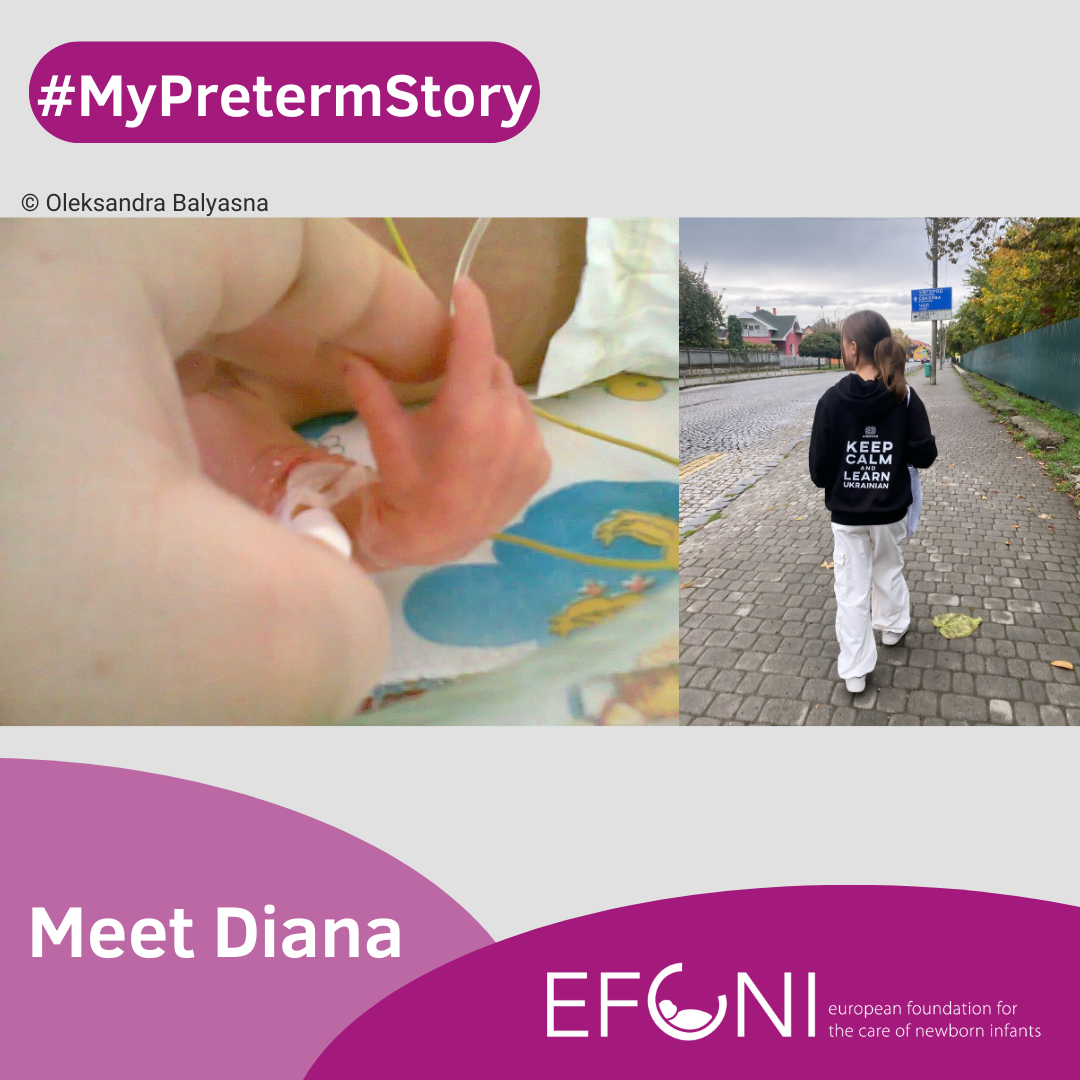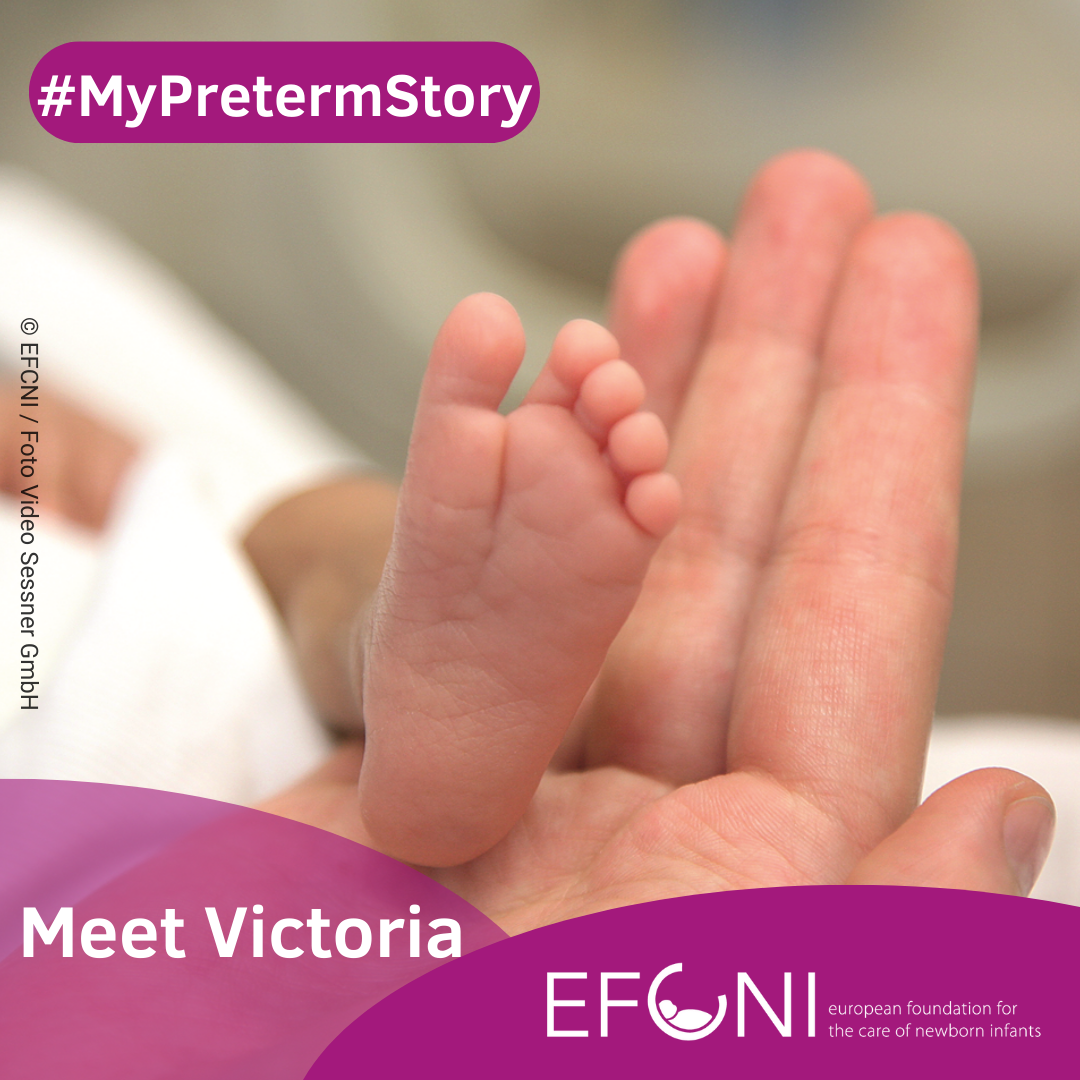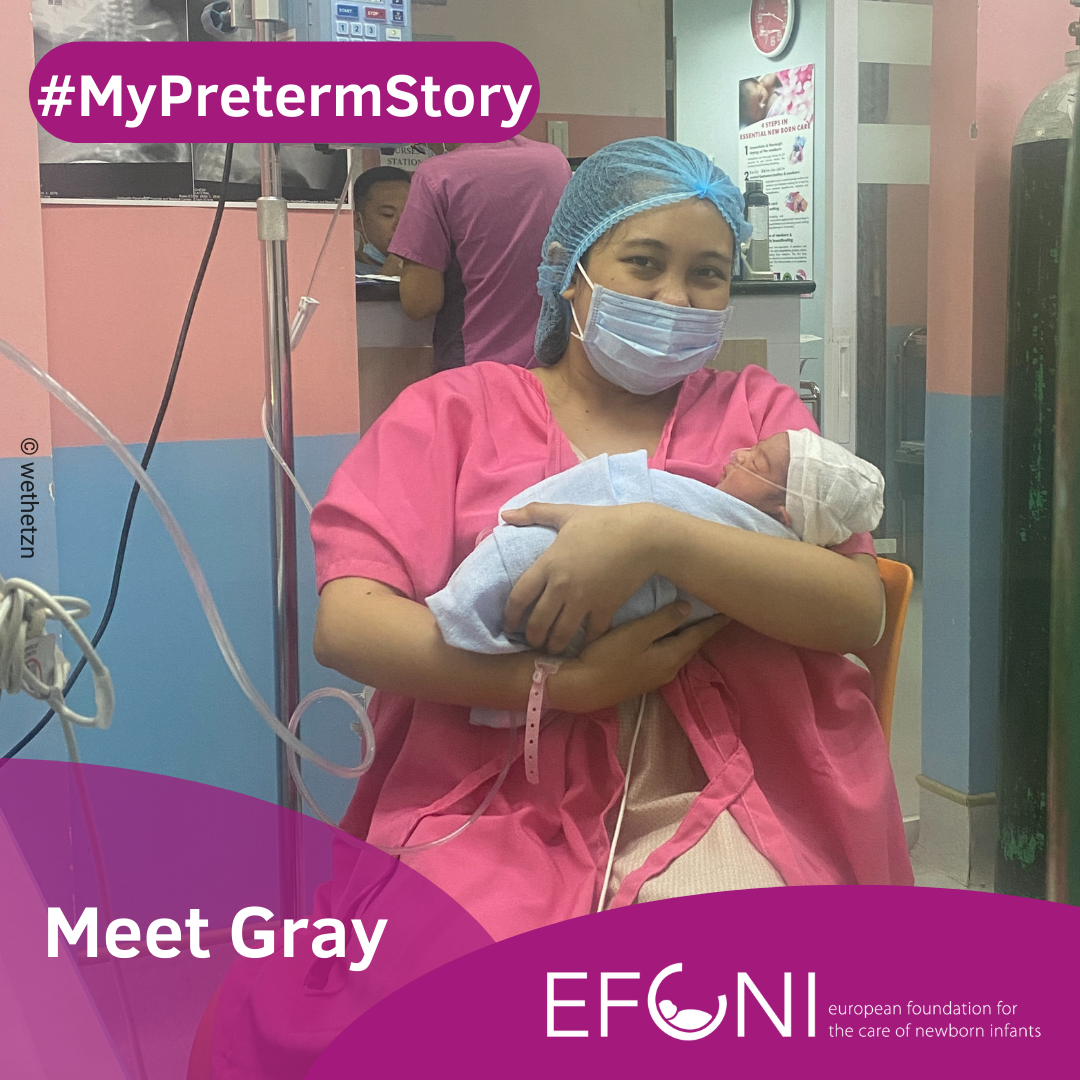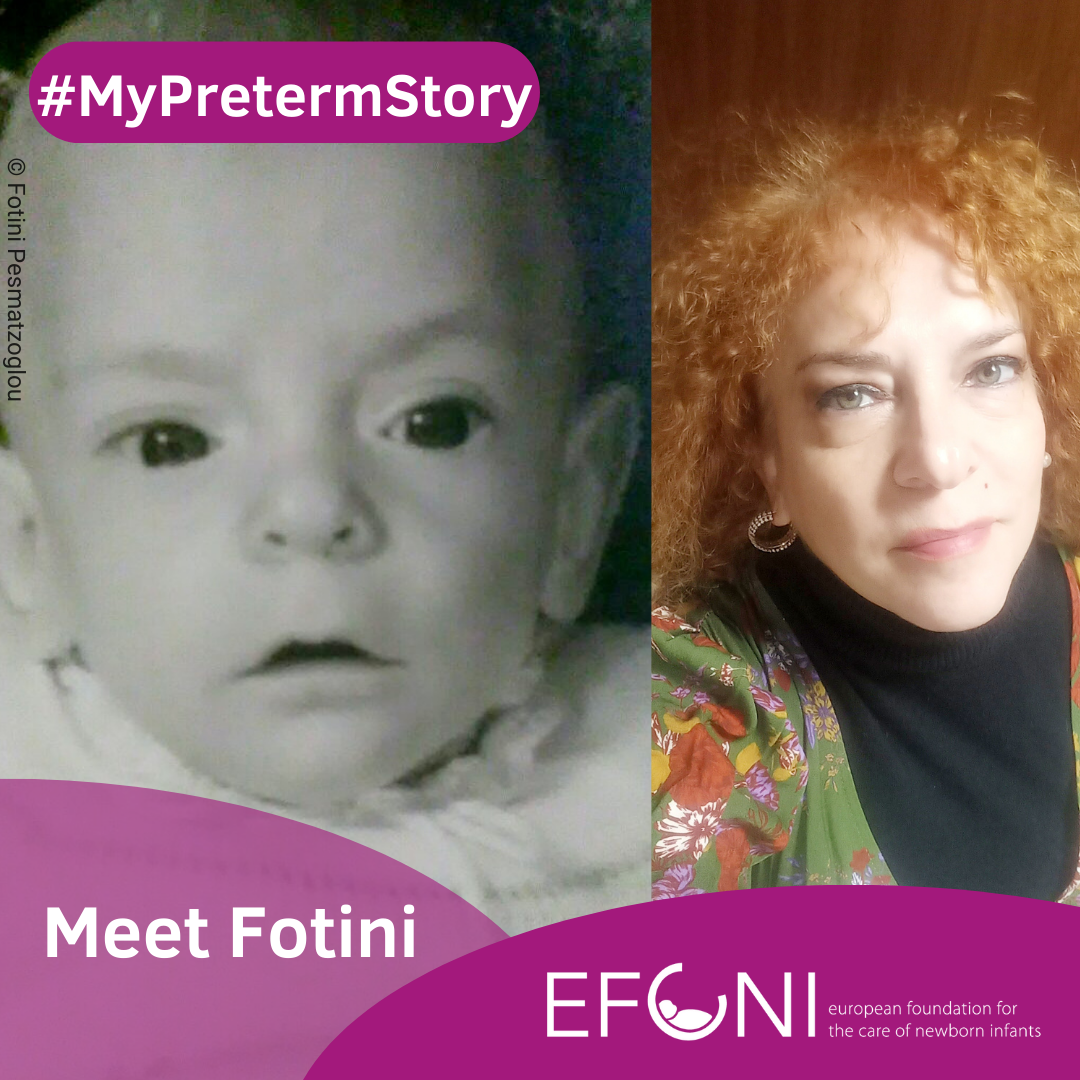Pregnancy Complications
Infant- and Family-Centered Developmental Care
Respiratory Infections
Neonatal Eye Health
Hygiene
Rare Diseases
We are honored to share powerful, personal stories from families around the world who have experienced the journey of preterm birth. Through #MyPretermStory, we aim to offer hope, strength, and connection to families who may be walking a similar path. These firsthand accounts remind us that no one is alone – and that every story matters.
By giving voice to parents and caregivers, we’re raising awareness of the challenges and triumphs of prematurity, celebrating the resilience of babies and families, and creating a supportive space for community.
If you would like to share your own story, we would be honored to include it. Please contact us, either via email (info(at)gfcni.org) or our social media channels.
Read the stories of Diana, Victoria, Gray, Alby, Fotini, and Mattija below.
(Trigger warning: mentions of blood and childbirth.)

“My daughter Diana weighed just over 1 kilogram when she was born. Emotionally, it was a whirlwind – stress, shock, fear of the unknown, and feeling completely out of control. I felt like I was the first person in the world to deliver a baby so early, so tiny, so fragile. I didn’t know how to ease her pain or bring her comfort. This wasn’t the maternity experience I had imagined. During our prenatal classes, no one ever mentioned the possibility of preterm birth.
One of the most unforgettable moments was when I heard, ‘You can do Kangaroo care and hold her.’ That precious half hour changed everything. While the NICU buzzed with activity, I held Diana skin-to-skin for the very first time. I felt her heartbeat, smelled her newborn scent, and finally connected with her in a way I hadn’t yet been able to. I didn’t know then how powerful and healing skin-to-skin contact is – for both mother and baby.
My biggest challenge was gaining the confidence to touch her. I was afraid it might hurt her. It took time to learn how to gently lift her, return her to the incubator, and hold her in my arms without fear.
After discharge, our challenges continued. We had to find a family doctor who understood the unique needs of a preterm baby. We had to organize her follow-up care, track her eye development (ROP), monitor her heart, ensure orthopedic and neurological checkups—all while learning an entirely new medical language.
My family was my rock. My father, although initially nervous about Diana’s tiny size, helped in every way he could – washing, ironing, and disinfecting all her clothes. My mom prepared meals, and my sister searched high and low for preemie-sized socks, clothes, and special pacifiers.
One memory that stays with me is our first Christmas and New Year’s Eve, which we spent in the hospital. Diana’s father wore a Santa hat and visited us, bringing warmth and support during a difficult time.
What helped me through it all was remembering that a close friend of mine had once shared that she herself was born prematurely. She’s now a strong, brilliant lawyer with a huge heart. I called her and said, ‘Tell me everything – how was it for you?’ Her story reminded me that preemies can survive, thrive, and shine, with no sign of having been born too soon.
Today
Today, Diana is taller than me – an active, artistic, and joyful child. She loves reading books, writing stories, making jewelry, and drawing. Even in the incubator, she was full of energy, crawling up and down, showing her strong will. That hasn’t changed – she knows what she wants and isn’t afraid to speak her mind.”
To Parents on the NICU Journey Today:
– Oleksandra

The Road Leading to You
“In the fall of 2013, I was overjoyed to learn I was pregnant with our second child. Our first daughter was not yet two, and I was lucky enough to spend my days caring for her while preparing for our new baby’s arrival.
But soon into the pregnancy, everything changed. I began hemorrhaging and was rushed to the emergency room, terrified that I was losing my baby. I was diagnosed with placenta previa and placed on prolonged bed rest. Oddly, this diagnosis brought relief – it meant that if I stayed still and let my baby grow, there was still hope.
Resting sounded easy – until I remembered I had a 21-month-old who had no interest in staying still. With no pain to remind me of the risk, the mental battle was enormous. It wasn’t until my mother-in-law said, “If you want this baby to live, sit down and do nothing. Otherwise, do as you wish,” that the gravity of the situation fully sank in. From that moment on, I did exactly that – for four long months.
Living in a foreign country with no nearby family, we relied on the incredible support of grandparents, who rotated visits for weeks and months at a time to help us get through.
Your Arrival
At 24 weeks, I was hospitalized again due to more hemorrhaging. Time became everything. I clung to fetal development charts, tracking what organs had formed and what risks each week brought. Every day felt like a victory.
On April 17, 2014, at 28 weeks gestation, Victoria was born via emergency C-section. Her heart rate had spiked dangerously due to stress. My body was no longer a safe place for her.
Everything happened so fast. She didn’t cry – her lungs weren’t ready. And then she was gone, taken straight to the NICU, placed in an incubator behind steel and glass, connected to tubes that fed and breathed for her. I couldn’t hold her, kiss her, or even say hello. I ached, knowing she didn’t feel our love from the start.
Three days later, on Easter Sunday, I held her for the first time.
Your Journey Through My Eyes
The NICU is a world unlike any other—quieted for tiny, fragile bodies, but full of the sounds of alarms and medical equipment. It’s a place of skin-to-skin contact, cautious hope, and constant emotion. There, we parents became instant teammates – strangers bonded by fear, hope, and love.
The babies were the true warriors. They fought to breathe, grow, and survive – outside the womb, on their own for hours at a time – fighting for the day they could finally go home.
Victoria spent two and a half months in the NICU before coming home. Today, nine years later, she is thriving. Her strength and spirit have never changed. She is sensitive, intuitive, and gives her whole heart to everything she does. She is patient but determined, always seeing things through with persistence and grace. Over the years, she has even shared glimpses of memories from her early days – reminders that she knew we were there, loving and cheering her on every step of the way.
Afterthoughts
Even after all these years, I’m surprised by the depth of unspoken emotions that still live inside me. Sharing Victoria’s story brings many of them to the surface. I’m grateful to have this platform to give voice to our experience.”
Messages for You
To families currently living the NICU journey: You are not forgotten.
To extended family and friends who want to help – tread gently with words, and go heavy on food and babysitting. We’re not our best selves in this situation. Avoid phrases like “Congratulations” or “It will be fine.” Instead, offer presence and practical support.
To the fathers, siblings, and partners of preterm babies: You deserve standing ovations for holding it all together – for your strength, faith, and the love you give.
To the mothers: Breastfeeding in the NICU is hard. Chairs are uncomfortable, and tiny mouths can’t always latch. Victoria didn’t nurse until she came home – but once the pressure was gone, it all came naturally. Don’t give up. Your presence alone works miracles. They chose you for a reason, and they feel you’re there.
And to every preterm baby – those who made it home, those still fighting, and those who became angels: You are seen. Your bravery is unmatched. Thank you for opening our eyes and teaching us what strength truly means.
– Caroline
(© CCS 2024)

“Hi, I’m Mommy Mei, a first-time mom to our 34-weeker baby boy, Gray. My husband, Gerald, and I were excited and well-prepared for the pregnancy. We thought we were ready for anything – until we faced the unexpected challenge of giving birth at 34 weeks.
We knew about premature birth, but we never imagined it would happen to us – especially during the first COVID-19 lockdown in the Philippines. At that time, there were no vaccines, no testing kits, and a lot of fear.
On the 17th day after the lockdown began, I woke up around 5 a.m. to use the bathroom – something routine during pregnancy. But this time was different. I was shocked to see blood on my underwear. When I called out to my husband, he saw that it was dripping onto the floor from the bed.
I had experienced spotting at 20 weeks, but this was far more intense. I knew something was wrong. We called my doctor and rushed to the hospital, navigating multiple checkpoints and explaining our emergency. We even had to change hospitals because the one we had planned to deliver at already had COVID-19 cases.
Gray Was Born
I’ll never forget the first thing I asked my doctor: ‘Is my baby going to live?’
After 24 hours of monitoring, our doctor scheduled an emergency C-section. Gray’s heartbeat had dropped, and my ultrasound revealed placenta previa, which explained the bleeding.
When Gray was born, we couldn’t have immediate skin-to-skin contact due to COVID safety protocols. He also couldn’t breathe on his own, so he was rushed to the NICU. I was allowed to see him a few hours later for Kangaroo Mother Care (KMC) and breastfeeding. My emotions were all over the place – relief that he was alive, but sadness that my husband could only see him through a window for 15 minutes a day.
I remember asking the NICU staff how long Gray would need to stay. The nurse said she couldn’t say – it could be weeks or even months. I tried to stay composed, but I broke down. I kept wondering: What did I do wrong? Could I have prevented this?
Finding Strength and Support
My husband, though anxious, kept a brave face. He started joining Facebook groups for preemie parents, searching for stories and advice. Those shared experiences gave us hope and strength. If our baby was fighting for his life, we had to fight alongside him.
Thankfully, Gray began to recover. And after just 9 days, he graduated from the NICU.
Today, Gray is turning 4 years old. He’s happy, active, and full of life. Who would’ve thought this vibrant boy once couldn’t even breathe on his own?
We’re forever grateful to the NICU doctors and nurses, and to the many parents who shared their stories online. That’s why we’re sharing ours too – to raise awareness and help other families feel less alone, more hopeful, and better prepared.”
– Mommy Mei

I started having cramping on the way home from my daughter’s swimming lesson. When I got home, I called the hospital—they told me to come in and get checked. I woke my husband Phil, who had just finished a night shift in the ICU, and asked him to drive me.
As we drove, the cramping grew stronger. I turned to my very tense, white-knuckled husband and said, “I think you should drop me at Emergency and go park the car.” His surprised reply: “Really?” I answered, “Yeah, really.”
After my first child was born overdue and without complications, I never imagined my second birth would unfold like this.
Alby was born at just 26 weeks and 3 days, on a hospital gurney in a corridor—before I could even make it to the operating room for an emergency C-section that was suddenly no longer needed.
I watched as the team worked to resuscitate my limp, fragile baby boy, barely more than a shiny red wisp. It was heartbreaking. I grieved for him, for us, for everything we thought this moment would be.
Saving a Child Feels a Lot Like Losing a Husband
Did you know that 84% of marriages involving children with special needs eventually break down?
I can’t explain how tough that time was for us. I had a young daughter who still needed me, a husband who missed me, and a baby in a box who I felt magnetically drawn to. I was being pulled in all directions—and felt like I was failing everyone.
Alby weighed 1,100 grams (2 lbs 4 oz) when he was born—a good weight for his gestational age. Still, he faced many of the classic challenges of extreme prematurity: jaundice, anemia, eye problems, brain hemorrhage, heart and breathing complications.
But he fought hard. After 78 days in neonatal and special care between the Mater Mothers’ Hospital in Brisbane and the Toowoomba Base Hospital, Alby came home.
Stereotypical Behaviors, Delays, and the Long Road to Diagnosis
Alby’s early life was a constant game of catch-up. Prematurity often causes developmental delays, and for a long time, we weren’t sure if his behaviors were part of that, or something more.
He’s never been obsessive or fixated on a specific interest. But he’s always had something in his hand—anything. One day, he lined up his toy cars, and I remember feeling thrilled by his fine motor skills. I thought nothing of it at the time.
It wasn’t until Alby’s Autism diagnosis that I looked back and thought: “Ahhh.”
Today, my 26-weeker is a teenager. It’s been a wild and beautiful ride. He’s thriving. We’ve been incredibly lucky to have the support of our families, Australia’s amazing healthcare system, wonderful friends, his school, and a caring peer community. It’s been deeply humbling.”
– Emma
Art Inspired by Life
Emma Thorp, Alby’s mother, is the artist behind the mixed media works on paper exhibit "Early", which chronicles eight years of life since Alby’s birth and his diagnoses of Autism and ADHD. Through her art, Emma offers a powerful glimpse into a world that’s often private, isolating, and emotionally intense—while also celebrating the unsung heroes who support families through these journeys.
Click here to view the full digital exhibition catalog.

“My name is Fotini, and I live in Thessaloniki, Greece. I was born in Bietigheim-Bissingen, Germany, on May 29, 1970, while my Greek parents were working abroad. My mother was 40 years old at the time and already had three children.
But my arrival into the world came much earlier than expected—at just 27 weeks and 1 day of gestation, weighing only 900 grams. I spent three months in the NICU, and my chances of survival were very slim.
Doctors feared I would live with some form of disability, as the organs of premature babies aren’t fully developed and can’t function independently. The earlier a baby is born, the higher the risk of health complications. But miraculously, I defied the odds. I grew up completely healthy, rarely sick, and led a fulfilling life, thanks largely to the unwavering love and care of my family—especially my older brother and sisters, who helped raise me while both of our parents worked.”
Overcoming the Odds
“Early interventions, strong support systems, and proper medical care can dramatically reduce the long-term effects of prematurity. I was lucky. I caught up with my peers in growth and development, and I’ve never stopped striving to learn and grow.
As a child, I was always curious, fast, and full of energy—determined to keep up with life, always in motion. I remember feeling sad about being small and weak, but as the years passed, I developed a strong sense of confidence and a natural leadership personality. I truly felt like the ugly duckling turning into a swan.”
Today
“Today, I’ve completed my university education and am just a few months away from finishing my second master’s degree at the Faculty of Engineering at Aristotle University of Thessaloniki. My life is enriched by my love for music, writing, and poetry—and most importantly, by the joy of being a mother to four wonderful children.
All of my children were born healthy and full-term, and now they’re grown. I’m incredibly proud of the people they’ve become.
So please, don’t lose faith. I never stopped believing in miracles. Preemies and their parents are true warriors. They fight battles with unknown outcomes, with courage, love, and relentless hope. Because life is worth fighting for.”
A Final Message
“When it comes to preemies, every single day counts.
It’s not a countdown—it’s a count-up.
They may arrive small, but they grow into giants of resilience and strength.
They are tiny fighters who become great life winners.”
– Fotini

“Our son was born at 27 weeks gestation. The pregnancy had been normal, and at my last doctor’s appointment—just a week before giving birth—I was told to expect a smooth and healthy pregnancy. But a few days later, I woke up urgently needing the bathroom. I was ashamed, thinking I had lost control of my bladder. I was also experiencing abdominal pain.
Two general practitioners told me it was just a urinary tract infection that could be treated with antibiotics. But on the third day, I started seeing a lot of blood, and my husband rushed me to the hospital. That’s when we learned the truth—my water had broken days earlier, and I was now in active labor.
The doctor examined me and said words I’ll never forget: “I see his hair. You’re in labor.”
Just four hours later, at 11:31 p.m. on January 15, 2022, our son Mattija was born, weighing 1,180 grams and measuring 29 cm. He was wrapped in a plastic sheet to keep him warm and placed on my chest. I will never forget that moment—the warmth of my son’s body against mine.
Seconds later, he was taken away to receive urgent care. He didn’t cry, but I felt his heartbeat and sensed he was breathing, albeit with difficulty. I told my husband to follow him—our baby needed his daddy. I assured him I was okay.
Then the nurses asked if I wanted to breastfeed. I thought it was too early, but with their help, my body produced milk. It felt like a miracle. Later, my husband returned with doctors and an incubator. Mattija was wrapped in a green towel, surrounded by tubes and wires. I held him for the first time and felt terrified—afraid I would hurt him, unsure how to even touch my son.
At 3 a.m., we were invited to see him in Room 209, Bai 2. I remember every detail: the blue lights, the monitors and alarms, the oxygen pipe, the tiny wires (yellow, red, green), and the pressure band on his arm. The staff explained the NICU protocols—how to use our door card, the breast milk process, pumping schedule, and visiting rules.
But I had only one question: “Will I ever take my son home and build a life with him?”
The doctor’s response: “Of course you will.”
That moment gave me hope. And after 90 days in the NICU, at 37 weeks, our son finally came home.”
Challenges We Faced
“Almost two years later, people still ask what we felt during that time. The answer: a storm of emotions—fear, guilt, uncertainty, hope, joy, luck, resilience, and despair.
Our parenting journey began in a way we never imagined. We had to learn to care for a baby so tiny that no supermarket sold diapers small enough. We learned how to read monitors, take blood pressure, and handle wires. We waited weeks for the smallest milestones—three months to bring him home, two months to hear his first coo, and three months for his first cry.
Each time we wanted to Kangaroo Care, we had to press a red button and wait for assistance. We waited longer than most to see him do tummy time, to sit, crawl, and finally, walk. But guess what? He did all of it.
Our challenges didn’t end there. Two stood out:
The breastfeeding journey – It was incredibly difficult. The lack of physical closeness made it harder to produce milk. I was also studying for my Licentiate in Canon Law, with exams just six days after giving birth. I noticed I produced more milk after exams—it helped me understand how much stress affects a mother’s body. I relied heavily on lactation consultants, fennel tea, Motilium, and adjusted my schedule to pump every two hours, including at night.
Reactions from family – My husband (Italian) and I (from Malta) had moved to Belgium to study. We were alone, navigating new parenthood in a pandemic. We kept our families updated with photos and calls, but not everyone responded supportively. Some thought we were strong, others thought we were overreacting. We had to set boundaries to protect our preemie—even when it meant not being understood. That was emotionally tough, but absolutely necessary.
It took me time to bond with my baby. I didn’t feel the “mother-tiger” instinct right away. And I felt guilty about it. But it’s normal. When you spend months pressing a button for permission to hold your baby, it takes time to build that instinct. But don’t worry—it will come.”
How Mattija Is Doing Today
“Today, at nearly 2 years old, Mattija weighs almost 11 kg and is 95 cm tall. He understands Maltese, Italian, Dutch, and even some English. He loves books, and he spends hours flipping pages, pointing at pictures, and repeating words. He is stubborn, cheeky, and full of intelligence. He notices everything and knows who truly cares for him.
He loves food—vegetables, fruits, grains, dairy, chocolate, and ice cream. He still enjoys breast milk before bedtime and graduated from physiotherapy last July. On October 19th, he walked with me to the podium when I received my Licentiate certificate.
He is our little warrior.”
A Message to Other Preemie Parents
“Dear fellow preemie parents, don’t give up.
Your journey will be tough—but it’s not impossible. Challenges may come from unexpected places, even family. But you are the foundation of your child’s world. Stay united as a couple. Support one another.
No one understands this journey like you do. You are your child’s everything.
Have courage.
Have faith.
As long as there is a heartbeat, there is hope.”
– Brenda
© 2026 GFCNI. All Rights Reserved.